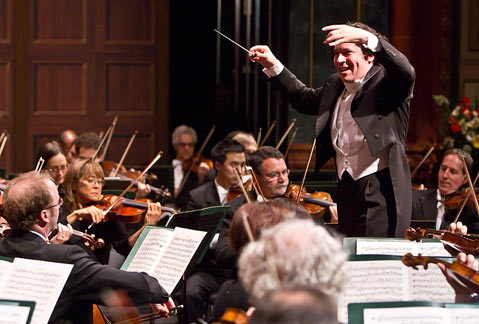Something New
Los Angeles, Santa Barbara, Ojai, and UCSB All Celebrate New Music

STILL DREAMING: To these ears, the deepest and most ear/mind-tweaking moment in another rich season of orchestral music at the Granada came in the middle of the Los Angeles Philharmonic concert two Saturdays back, the first led locally by the humble-yet-heroic man-wonder Gustavo Dudamel. Hereabouts, incurable orchestra music fans like us are accustomed to being lulled by conventional wisdom and gewgaws from the standard repertoire, but we got something entirely different with the wowing sounds of Henri Dutilleux’s L’arbre des songes (The Tree of Dreams). Written for Isaac Stern in 1985 and deftly blending postmodernism and sensuous, dreamy sonorities, the piece was a wonder to behold, live and in the sumptuous orchestral flesh made possible by this great orchestra (which usually steers clear of adventurous fare when they head up to our little town).
Cleverly, and politically, this juicy recent music came sandwiched between the sonic comfy-chair business of Brahms’s Academic Festival Overture and his Symphony No. 1, the Dutilleux—played with an aptly controlled power by Greek violinist Leonidas Kavakos (whose looming stature made Dudamel seem shorter than he is). It served as a bodacious wake-up call for those wondering if it’s possible to write new orchestra music (a concerto, no less, rather than just a concert-opening bonbon) that’s both intellectually and emotionally embracing.
We’ve caught wind of other riveting and post-19th-century treats this season, if nothing so potent and fresh as the Dutilleux. The Santa Barbara Symphony gave a West Coast premiere of Avner Dorman’s playful, easy-does-it Lost Souls last weekend, and its February program—thanks to a late-breaking reshuffling—was a memorable encounter with music by Nino Rota and Shostakovich’s feisty/cool Concerto No. 1 for trumpet and piano. The Vienna Philharmonic, besides being a consummately fine ensemble deserving its lofty plaudits, rocked the Granada with Bartók’s The Miraculous Mandarin, and the Los Angeles Chamber Orchestra nicely conjured up Lutoslawski’s homage to Bartók, Musique funèbre (Funeral Music).
MORE NEW MUSIC: While the official concert season has slipped into summer slumber, have no fear—there are plenty of contemporary-leaning treats in store, especially to the south of us. Next Tuesday, down in the soothing splendor of Disney Hall, the L.A. Phil’s fairly visionary Green Umbrella series—really one of the most important new music traditions in America—beckons mightily. The series brings back John Adams as conductor, and the great violinist Jennifer Koh as soloist, playing music by (and with) composer/electric-guitarist Steve Mackey, and a world-premiere solo violin work by Missy Mazzoli. There are local links here, once removed: We just heard Koh last week at Hahn Hall in brave-new-solo-violin-recital form, and Mackey was a featured guest at the Ojai Music Festival two years back.
Speaking of which … the Ojai Music Festival this year, June 9-12, looks to be another compelling reason to hang out in that god-kissed town for a weekend. Dawn Upshaw is the official music director, and the hearty mix of characters includes director Peter Sellars, Richard Tognetti and his Australian Chamber Orchestra (whose Santa Barbara visit two seasons back still incites tingly memories), and also, from the jazz sector, the wondrous Maria Schneider Orchestra. This is no light-hearted jazz concession: Schneider, a star of the contemporary big band universe, incorporates classical elements in her sophisticated music more than most in her field, and the festival’s Sunday-night finale at Libbey Bowl (being unveiled in its newly renovated form) features the world premiere of a new Schneider score, with Upshaw and the Australian ensemble doing the honors. Mark those calendars.
CODED, LOCKED, AND LOADED: When it comes to experimental music with computers in the toolbox, a kind of mini-revolution is underway out at UCSB, and we the curious public get a taste of what’s happening courtesy of the CREATE/MAT concert at Lotte Lehmann Concert Hall on Thursday, May 19. This comes on the heels of a concert last Friday of music by students from electronic/computer programs at several academic hotbeds of activity in the field: CalArts, Mills College, Stanford, UCSD, and, yes, UCSB.
For my money—as a long-intrigued but hardly scholarly electronic-music fan—MAT head Curtis Roads is making some of the more fascinating computer music on the scene. His works, usually short-ish but packed with detail and data, can be both cerebral and sensual in their expressive and exploratory powers. We’ll see what’s in store tonight with his piece Never, which reconstitutes (or “regranulates,” to use the proper term in his “granular synthesis” process) materials from earlier pieces: In short, this is music recycled but reborn, an artistic equation relevant in some way to virtually all music and art. To quote the KUSC mantra, “All music was new once.”



